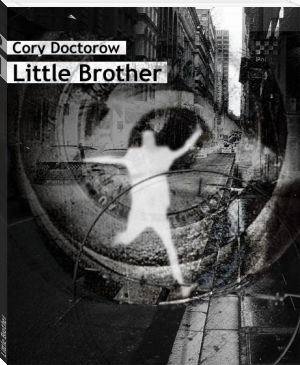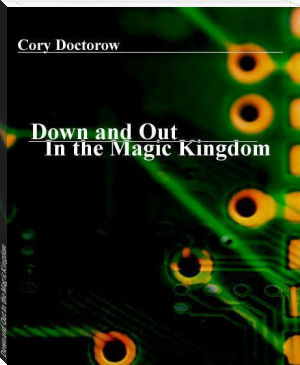Little Brother - Cory Doctorow (book recommendations website txt) 📗

- Author: Cory Doctorow
Book online «Little Brother - Cory Doctorow (book recommendations website txt) 📗». Author Cory Doctorow
They took away my jeans, and I spent another day in the cell. The walls were scratched cement over a steel grid. You could tell, because the steel was rusting in the salt air, and the grid shone through the green paint in red-orange. My parents were out that window, somewhere.
They came for me again the next day.
"We've been reading your mail for a day now. We changed the password so that your home computer couldn't fetch it."
Well, of course they had. I would have done the same, now that I thought of it.
"We have enough on you now to put you away for a very long time, Marcus. Your possession of these articles --" she gestured at all my little gizmos -- "and the data we recovered from your phone and memory sticks, as well as the subversive material we'd no doubt find if we raided your house and took your computer. It's enough to put you away until you're an old man. Do you understand that?"
I didn't believe it for a second. There's no way a judge would say that all this stuff constituted any kind of real crime. It was free speech, it was technological tinkering. It wasn't a crime.
But who said that these people would ever put me in front of a judge.
"We know where you live, we know who your friends are. We know how you operate and how you think."
It dawned on me then. They were about to let me go. The room seemed to brighten. I heard myself breathing, short little breaths.
"We just want to know one thing: what was the delivery mechanism for the bombs on the bridge?"
I stopped breathing. The room darkened again.
"What?"
"There were ten charges on the bridge, all along its length. They weren't in car-trunks. They'd been placed there. Who placed them there, and how did they get there?"
"What?" I said it again.
"This is your last chance, Marcus," she said. She looked sad. "You were doing so well until now. Tell us this and you can go home. You can get a lawyer and defend yourself in a court of law. There are doubtless extenuating circumstances that you can use to explain your actions. Just tell us this thing, and you're gone."
"I don't know what you're talking about!" I was crying and I didn't even care. Sobbing, blubbering. "I have no idea what you're talking about
!"
She shook her head. "Marcus, please. Let us help you. By now you know that we always get what we're after."
There was a gibbering sound in the back of my mind. They were insane
. I pulled myself together, working hard to stop the tears. "Listen, lady, this is nuts. You've been into my stuff, you've seen it all. I'm a seventeen year old high school student, not a terrorist! You can't seriously think --"
"Marcus, haven't you figured out that we're serious yet?" She shook her head. "You get pretty good grades. I thought you'd be smarter than that." She made a flicking gesture and the guards picked me up by the armpits.
Back in my cell, a hundred little speeches occurred to me. The French call this "esprit d'escalier" -- the spirit of the staircase, the snappy rebuttals that come to you after you leave the room and slink down the stairs. In my mind, I stood and delivered, telling her that I was a citizen who loved my freedom, which made me the patriot and made her the traitor. In my mind, I shamed her for turning my country into an armed camp. In my mind, I was eloquent and brilliant and reduced her to tears.
But you know what? None of those fine words came back to me when they pulled me out the next day. All I could think of was freedom. My parents.
"Hello, Marcus," she said. "How are you feeling?"
I looked down at the table. She had a neat pile of documents in front of her, and her ubiquitous go-cup of Starbucks beside her. I found it comforting somehow, a reminder that there was a real world out there somewhere, beyond the walls.
"We're through investigating you, for now." She let that hang there. Maybe it meant that she was letting me go. Maybe it meant that she was going to throw me in a pit and forget that I existed.
"And?" I said finally.
"And I want you to impress on you again that we are very serious about this. Our country has experienced the worst attack ever committed on its soil. How many 9/11s do you want us to suffer before you're willing to cooperate? The details of our investigation are secret. We won't stop at anything in our efforts to bring the perpetrators of these heinous crimes to justice. Do you understand that?"
"Yes," I mumbled.
"We are going to send you home today, but you are a marked man. You have not been found to be above suspicion -- we're only releasing you because we're done questioning you for now. But from now on, you belong
to us. We will be watching you. We'll be waiting for you to make a misstep. Do you understand that we can watch you closely, all the time?"
"Yes," I mumbled.
"Good. You will never speak of what happened here to anyone, ever. This is a matter of national security. Do you know that the death penalty still holds for treason in time of war?"
"Yes," I mumbled.
"Good boy," she purred. "We have some papers here for you to sign." She pushed the stack of papers across the table to me. Little post-its with SIGN HERE printed on them had been stuck throughout them. A guard undid my cuffs.
I paged through the papers and my eyes watered and my head swam. I couldn't make sense of them. I tried to decipher the legalese. It seemed that I was signing a declaration that I had been voluntarily held and submitted to voluntary questioning, of my own free will.
"What happens if I don't sign this?" I said.
She snatched the papers back and made that flicking gesture again. The guards jerked me to my feet.
"Wait!" I cried. "Please! I'll sign them!" They dragged me to the door. All I could see was that door, all I could think of was it closing behind me.
I lost it. I wept. I begged to be allowed to sign the papers. To be so close to freedom and have it snatched away, it made me ready to do anything. I can't count the number of times I've heard someone say, "Oh, I'd rather die than do something-or-other" -- I've said it myself now and again. But that was the first time I understood what it really meant. I would have rather died than go back to my cell.
I begged as they took me out into the corridor. I told them I'd sign anything.
She called out to the guards and they stopped. They brought me back. They sat me down. One of them put the pen in my hand.
Of course, I signed, and signed and signed.
My jeans and t-shirt were back in my cell, laundered and folded. They smelled of detergent. I put them on and washed my face and sat on my cot and stared at the wall. They'd taken everything from me. First my privacy, then my dignity. I'd been ready to sign anything. I would have signed a confession that said I'd assassinated Abraham Lincoln.
I tried to cry, but it was like my eyes were dry, out of tears.
They got me again. A guard approached me with a hood, like the hood I'd been put in when they picked us up, whenever that was, days ago, weeks ago.
The hood went over my head and cinched tight at my neck. I was in total darkness and the air was stifling and stale. I was raised to my feet and walked down corridors, up stairs, on gravel. Up a gangplank. On a ship's steel deck. My hands were chained behind me, to a railing. I knelt on the deck and listened to the thrum of the diesel engines.
The ship moved. A hint of salt air made its way into the hood. It was drizzling and my clothes were heavy with water. I was outside, even if my head was in a bag. I was outside, in the world, moments from my freedom.
They came for me and led me off the boat and over uneven ground. Up three metal stairs. My wrists were unshackled. My hood was removed.
I was back in the truck. Severe haircut woman was there, at the little desk she'd sat at before. She had a ziploc bag with her, and inside it were my phone and other little devices, my wallet and the change from my pockets. She handed them to me wordlessly.
I filled my pockets. It felt so weird to have everything back in its familiar place, to be wearing my familiar clothes. Outside the truck's back door, I heard the familiar sounds of my familiar city.
A guard passed me my backpack. The woman extended her hand to me. I just looked at it. She put it down and gave me a wry smile. Then she mimed zipping up her lips and pointed to me, and opened the door.
It was daylight outside, gray and drizzling. I was looking down an alley toward cars and trucks and bikes zipping down the road. I stood transfixed on the truck's top step, staring at freedom.
My knees shook. I knew now that they were playing with me again. In a moment, the guards would grab me and drag me back inside, the bag would go over my head again, and I would be back on the boat and sent off to the prison again, to the endless, unanswerable questions. I barely held myself back from stuffing my fist in my mouth.
Then I forced myself to go down one stair. Another stair. The last stair. My sneakers crunched down on the crap on the alley's floor, broken glass, a needle, gravel. I took a step. Another. I reached the mouth of the alley and stepped onto the sidewalk.
No one grabbed me.
I was free.
Then strong arms threw themselves around me. I nearly cried.
CHAPTER 5
This chapter is dedicated to Secret Headquarters in Los Angeles, my drop-dead all-time favorite comic store in the world. It's small and selective about what it stocks, and every time I walk in, I walk out with three or four collections I'd never heard of under my arm. It's like the owners, Dave and David, have the uncanny ability to predict exactly what I'm looking for, and they lay it out for me seconds before I walk into the store. I discovered about three quarters of my favorite comics by wandering into SHQ, grabbing something interesting, sinking into one of the comfy chairs, and finding myself transported to another world. When my second story-collection, OVERCLOCKED, came out, they worked with local illustrator Martin Cenreda to do a free mini-comic based on Printcrime, the first story in the book. I left LA about a year ago, and of all the things





Comments (0)